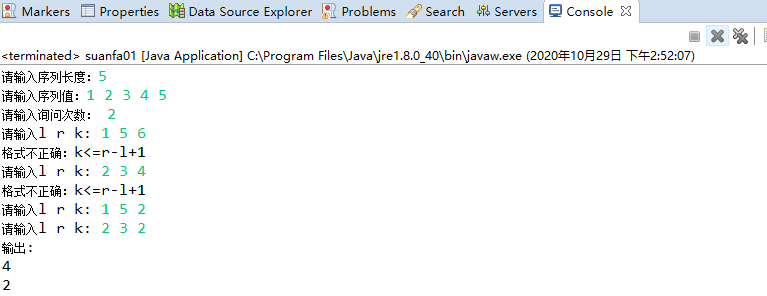2020软件工程作业04
| 这个作业属于哪个课程 | https://edu.cnblogs.com/campus/zswxy/2018SE |
|---|---|
| 这个作业要求在哪里 | https://edu.cnblogs.com/campus/zswxy/2018SE/homework/11406 |
| 这个作业的目标 | 学习算法 ,寻找数组中第K大是数 ,二叉树的先、中、后 序遍历与层级遍历 |
| 其他参考文献 | https://www.cnblogs.com/silence-x/p/10544072.html 以及哔哩哔哩视频 |
| 学号 | 20189640 |
题目名称:寻找数组中第K大是数
解题思路: 先分别输入序列长度以及序列的数值,将输入的序列的数值放入一个数组保存下来,再输入l,r,k的值,输入以后进行k<=r-l+1的判断运算,如果不符合判断条件的话,将本来消耗的一次循环次数减掉,从而保证询问次数不变。从数组中取数进行比较,输出结果放入结果集,最后遍历结果集。
解题代码:
`
package aaa;
import java.util.Arrays;
import java.util.Scanner;
public class suanfa01 {
public static void main(String[] args) {
Scanner scanner =new Scanner(System.in);
int n=0;
System.out.print("请输入序列长度:");
n =scanner.nextInt();
int [] line = new int[n];
System.out.print("请输入序列值:");
for (int i = 0; i < n; i++) {
line[i]=scanner.nextInt();
}
System.out.print("请输入询问次数:");
int m =scanner.nextInt();
int l,r,k;
int []answer =new int[m];
for (int j = 0; j < m; j++) {
System.out.print("请输入l r k:");
l =scanner.nextInt();
r=scanner.nextInt();
k=scanner.nextInt();
//比较k<=r-l+1
if(k<=r-l+1){
int[] newline =Arrays.copyOfRange(line, l-1, r);
//数组排序方法
Arrays.sort(newline);
answer[j]=newline[newline.length-k];
}else{
System.out.println("格式不正确:k<=r-l+1");
j--;
}
}
System.out.println("输出:");
for (int i : answer) {
System.out.println(i);
}
}
}
`
运行结果图:

题目名称:二叉树的先、中、后 序遍历与层级遍历
解题思路:
先序遍历:先访问根节点然后遍历左子树,在前序遍历右子树。
中序遍历:先访问左节点然后访问根节点,再中序遍历右子树。
后序遍历:先访问左节点然后访问右结点,再访问根节点。
层级遍历:从上往下从左到右访问。
解题代码:
`
package aaa;
import java.util.LinkedList;
public class suanfa02 {
public static void main(String[] args) {
/* 作业要求:叉树的先、中、后 序遍历与层级遍历
自己实现四个方法,main方法中调用,将结果打印到控制台
*/
/* 二叉树的结构
A
/ \
T 6
/
D
/ \
N 5
/ \ /
B 4 1
\
9
*/
Node root = into();
// 先序遍历
System.out.print("先序遍历:");
A(root);
System.out.println();
// 中序遍历
System.out.print("中序遍历:");
B(root);
System.out.println();
// 后续遍历
System.out.print("后续遍历:");
C(root);
System.out.println();
// 层级遍历
System.out.print("层级遍历:");
D(root);
System.out.println();
}
private static void A(Node tree) {
// TODO 先序遍历
if (tree != null) {
System.out.print(tree.data + " ");
A(tree.l);
A(tree.r);
}
}
private static void B(Node tree) {
// TODO 中序遍历
if (tree != null) {
B(tree.l);
System.out.print(tree.data + " ");
B(tree.r);
}
}
private static void C(Node tree) {
// TODO 后续遍历
if (tree != null) {
C(tree.l);
C(tree.r);
System.out.print(tree.data + " ");
}
}
private static void D(Node tree) {
// TODO 层级遍历
if (tree != null) {
LinkedList<Node> linkedList = new LinkedList<Node>();
linkedList.offer(tree);
Node node = null;
while (!linkedList.isEmpty()) {
node = (Node) linkedList.pop();
System.out.print(node.data + " ");
if (node.l != null) {
//将出队结点的左子树根入队
linkedList.offer(node.l);
}
if (node.r != null) {
//将出队结点的右子树根入队
linkedList.offer(node.r);
}
}}
}
// 构建一颗树,返回根节点
private static Node into(){
Node root = new Node("A");
Node node1 = new Node("T");
Node node2 = new Node("D");
Node node3 = new Node("N");
Node node4 = new Node("B");
Node node5 = new Node("6");
Node node6 = new Node("5");
Node node7 = new Node("4");
Node node8 = new Node("9");
Node node9 = new Node("1");
root.l = node1;
node1.l = node2;
node2.l = node3;
node2.r = node6;
node3.r = node7;
node7.r = node8;
node6.l = node9;
node3.l = node4;
root.r = node5;
return root;
}
// 节点
static class Node{
// 数据
Object data;
// 左孩子
Node l;
// 右孩子
Node r;
public Node(){}
public Node(Object data) {
this.data = data;
this.l = null;
this.r = null;
}
public Node(Object data, Node l, Node r) {
this.data = data;
this.l = l;
this.r = r;
}
}
}
`
运行结果图:



